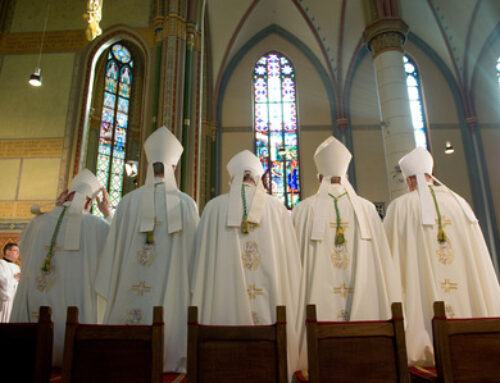 On the anniversary of Roe v. Wade, January 22, 2019, the Florida Conference of Catholic Bishops published a pastoral letter that was signed by every bishop and included in parish bulletins across the state. It began by citing this powerful passage from Pope Francis’ Amoris Laetitia.
On the anniversary of Roe v. Wade, January 22, 2019, the Florida Conference of Catholic Bishops published a pastoral letter that was signed by every bishop and included in parish bulletins across the state. It began by citing this powerful passage from Pope Francis’ Amoris Laetitia.
. . . If the family is the sanctuary of life, the place where life is conceived and cared for, it is a horrendous contradiction when it becomes a place where life is rejected and destroyed. So great is the value of a human life, and so inalienable the right to life of an innocent child growing in the mother’s womb, that no alleged right to one’s own body can justify a decision to terminate that life, which is an end in itself and which can never be considered the “property” of another human being.
The Bishops’ letter went on to lament the legalization of abortion, to pray for those it has affected, and to condemn the procedure. Five of its six paragraphs were devoted to that purpose. The sixth, however, which appeared early in the document and broke its narrative flow, shifted awkwardly to a milestone celebrated a year earlier—the fiftieth anniversary of Humanae Vitae and the canonization of its author, Paul VI, last October. That paragraph included the following passage:
This prophetic encyclical shook the world 50 years ago with its countercultural instruction rejecting artificial contraception and welcoming children as gifts from God that are part of married love. Yet, growing numbers of women of all faiths and no faith are rejecting artificial contraception and realizing that fertility is not a disease to be ‘treated.’ Rather, spouses are discovering natural family planning, as it promotes healthy reproduction, healthy relationships, and a healthy environment.
That passage raises two questions. The first is, what evidence do the bishops have that “growing numbers of women of all faiths” are “rejecting” artificial contraception and “discovering” natural family planning?
It seems likely that they have no real evidence but instead are simply reasoning, “The birthrate has drastically declined in economically advanced countries, so that must mean natural family planning is working.” If that is the case, the prelates are guilty of an embarrassing leap of logic, for it is much more reasonable to believe the reverse—that women “discovered” artificial contraception and “rejected” natural family planning.
(Incidentally, even if the declining birth rate were attributable to natural family planning, it is strange that the bishops would take such a celebratory tone—in every one of twelve Catholic countries in Europe the birth rate has fallen far below the 2.1 replacement rate, a fact that may foreshadow the extinction of the Catholic family in those countries.)
In any case, if the bishops truly believed their assertion, they would by now have encouraged diocesan priests to hail the success of natural family planning from their pulpits. But I have never heard such a homily, nor found any reports of one. If there were any, the congregations would surely have chuckled at the homilists’ naiveté.
The second question is, why did the bishops mention artificial conception at all in their otherwise laudatory condemnation of abortion?
I believe the answer is because of another leap of logic: The bishops presumably inserted the issue of contraception to quiet the controversy that Humane Vitae created and that led to the disaffection of millions of Catholics. The bishops’ reasoning seems to have been, “Because Paul VI has been declared a saint, his encyclical must be considered saintly, so mentioning it in this context will surely turn widespread rejection of its message to widespread acceptance.”
The flaw in this reasoning is the assumption that canonization validates all of the saint’s thoughts and words. That assumption conflates the person and the idea when they are actually very different. All people, saints included, bear the twin marks of original sin—clouded minds and weakened wills. Saints differ from the rest of us NOT in having been free from error but rather in having been exceptional in loving God with all their hearts, souls, minds, and strength. (See Mark 12:31)
Here are three examples of saints’ intellectual errors concerning the nature of women:
St. Augustine: “What is the difference whether it is in a wife or a mother, it is still Eve the temptress that we must beware of in any woman… I fail to see what use woman can be to man, if one excludes the function of bearing children.” Saint Albertus Magnus: “One must be on one’s guard with every woman, as if she were a poisonous snake and the horned devil . . . Her feelings drive woman toward every evil, just as reason impels man toward all good.” St. Thomas Aquinas: “As regards the individual nature, woman is defective and misbegotten . . . .”
Today, the Church recognizes the profound error (and unparalleled slander) of all three beliefs. Yet it does not question the sanctity of the saints who expressed them because it understands that not even the most exceptional love of God and His truth guarantees inerrancy. In other words, Paul VI could have been mistaken in his view of the morality of contraception and yet fully deserving of canonization. For the Florida Bishops to imply otherwise will not persuade the laity to accept Humanae Vitae, but it could have the ironic effect of making them question the quality of the bishops’ thought processes, even when applied collaboratively.
Perhaps the bishops had another purpose for inserting the paragraph on contraception into their commentary on abortion—to bolster their condemnation of abortion. In other words, they may have thought, “Mentioning our condemnation of contraception as well as that of abortion will remind Catholics and non-Catholics alike of our historical consistency on both matters, and that reminder will surely strengthen our position on both.”
If they thought this, they will surely be disappointed, because referencing the Church’s teaching on contraception is certain to remind many Catholics of their disagreement with the Church about that subject. Equally certain is that it will remind many non-Catholics of their long-held view that the Catholic Church has been foolishly intransigent on contraception. Neither reminder has much chance of enhancing the Bishops’ credibility.
Any way one considers the bishops’ melding of contraception and abortion, it was a mistake that they should by all means avoid repeating.
Copyright © 2019 by Vincent Ryan Ruggiero. All rights reserved



